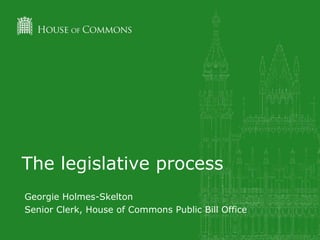
Primary legislation in the House of Commons
- 1. The legislative process Georgie Holmes-Skelton Senior Clerk, House of Commons Public Bill Office
- 2. Types of Bills • Public Bills – either Government or Private Members’ Bills • Private Bills – “legislation of a special kind for conferring particular powers or benefits on any person or body of persons – including individuals, local authorities, companies, or corporations” (Erskine May) • Hybrid Bills – affect “a particular private interest in a manner different from the private interest of other persons or bodies of the same category or class” (Speaker Hylton-Foster) – Eg. Crossrail Bill
- 3. Stages of a Bill
- 4. Second Reading • First substantive proceedings on the Bill, usually a whole day • Debate on general principles of Bill • Debate will usually be opened or wound up by Cabinet minister in charge of the Bill • Opponents of a Bill can table a “reasoned amendment” – statement of reasons why Bill should be rejected • Often no vote at Second Reading
- 5. What’s next? • Most Bills committed to a Public Bill Committee • Some Bills considered “in Committee” on the floor of the House: known as Committee of the whole House (CwH) – Major constitutional importance (e.g. Fixed-Term Parliaments Bill) – Emergency legislation (e.g. Northern Ireland (St Andrews Agreement) Bill) – Uncontroversial Bills (e.g. Geneva Conventions and United Nations Personnel (Protocols) Bill) • Bills can be divided between CwH and PBC – Finance Bill
- 6. Public Bill Committee 1. Take oral and written evidence – Public can submit evidence like a Select Committee inquiry – Written evidence published on website and circulated to Members 1. Line-by-line scrutiny of the Bill
- 8. Order of consideration • Text of Bill considered in a set order: – Clauses – New clauses – Schedules – New schedules – Preamble (if any) – Title (if amended) • Programme motion can vary this order, usually to debate schedules after the clauses to which they apply
- 9. Amendments • Can be tabled by any Member of the House • Clerks advise backbenchers and Opposition front bench on amendments as required • Amendments grouped together to assist debate • Amendments must be in order: relevant and within scope • Chair has power of selection of amendments • Not all amendments formally put to decision Tip: amendment papers can be found on the Bill pages at www.parliament.uk/ business/bills-and- legislation
- 10. Report Stage and Third Reading • New version of Bill “as amended in Committee” printed and debated on the floor of the House • Any Member can table amendments • Grouping and selection as at Committee, but more stringent • Different order of consideration – New clauses – Amendments to clauses – New schedules – Amendments to schedules • Third Reading: – one hour, immediately after Report – Similar to Second Reading
- 11. What now? • After Third Reading, Bill goes to the House of Lords • Lords undertakes same process with some differences – Committee stage in the Lords on the floor of the House – No programming – Amendments possible at Third Reading – Financial legislation (“Money Bills”) passed with little scrutiny – No Government majority
- 12. Ping-pong (Consideration of Amendments) • Either: – No amendments in Lords, straight to Royal Assent • Or: – amendments sent back to Commons for consideration – Commons can accept, disagree, amend, offer amendments in lieu – “ping-pong” between Houses can go on for some time – Bill can be lost on “double insistence” – Reasons Committees
- 13. Royal Assent • Once both Houses agree the text of a Bill, submitted to the Queen for Royal Assent • Speaker announces Royal Assent in the Commons
- 14. The Parliament Acts • The Parliament Act 1911 and the Parliament Act 1949 define the relationship between the Commons and the Lords in terms of the passage of legislation • If Commons passes a Bill in two successive Sessions and the Lords rejects it, it can become law after the second rejection without the consent of the Lords • Used very rarely – last was the passage of the Hunting Act 2004
- 15. Any questions?
Hinweis der Redaktion
- general principles of the Bill, not strictly limited to its contents – may include circumstances surrounding Bill or alternative means of attaining Bill’s purpose
- Northern Ireland Misc recent example divided committal
- Witnesses agreed between Government and Opposition Whips – includes Minister Evidence can help inform subsequent debate on scrutiny of Bill
- Appointed by the Committee of Selection; usually 18 Members but can be more or fewer Proportions reflect political composition of the Commons as a whole Junior minister in charge of the Bill, Government Whip, Opposition spokesman, Opposition Whip, + backbenchers Chaired by a member of the Panel of Chairs, senior backbench MPs appointed by the Speaker Generally meet mornings and afternoons, Tuesdays and Thursdays Usually managed by a clerk in the Public Bill Office
- Only member of PBC can move an amendment New version
- Scope limited to contents of the Bill Theoretically possible to move reasoned amendment but extremely rare
- Clerk walks the hard copy and is received by a clerk in the Lords Bill endorsed in Norman French by the Clerk of the House and accompanied by a Message
- Both Houses have to agree on exact text of every Bill
- RA a matter of course; no Bill has been refused since 1707/8 – Queen Anne Formula is “La Reyne le veult” (“The Queen consents”); formula for rejection is “La Reyne se avisera” (“The Queen will take advice”: i.e. “no”)
- 1949 act reduced delaying powers of the Lords
